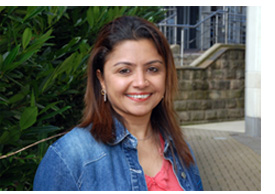Power to the people
Thu, 23 Aug 2012 11:03:00 BST
How new generation lithium batteries could store electricity and defy power cuts
 MASSIVE improvements in the size and capacity of lithium batteries, so that they can power cars and provide a reliable, environmentally-friendly energy source for rural areas, are the goal of new research links between the University of Huddersfield and some of the most eminent scientists at institutes in India.
MASSIVE improvements in the size and capacity of lithium batteries, so that they can power cars and provide a reliable, environmentally-friendly energy source for rural areas, are the goal of new research links between the University of Huddersfield and some of the most eminent scientists at institutes in India.
They are being forged by Dr Pooja Panchmatia (pictured), a Senior Research Fellow within the chemistry department at the University of Huddersfield. An expert in the use of computational techniques to understand the unique properties of materials, she has returned from a packed 15-day visit to India during which she visited several universities, plus the Indian Institute of Science (IISc), one of the world’s most-respected research institutions.
She also held talks with leading scientists, including Professor C.N.R. Rao, who is scientific advisor to the Indian Government and Dr Mridula Bharadwaj Dixit of CSTEP (Centre for study of Science, Education, Technology and Policy), a programme within the Indian Defence Research and Development Organisation.
Now Dr Panchmatia, in tandem with Professor Aninda Bhattacharyya, of the Indian Institute of Science, is working on plans for a major Indo-UK science seminar. If it is successful in its bid to receive funding, it will take place in December in Bangalore, drawing together leading experts on lithium batteries in both countries.
“We are finding ways to scale up lithium batteries, moving them away portable electronic devices to electric vehicles and rural electrification, and giving power to the people literally,” said Dr Panchmatia.
A new breed of batteries could be used for grid storage, she added, helping to solve the problems of power cuts that have recently hit large swathes of India.
“You could collect power from renewable sources such as solar energy and wind, store it during peak times and use it when you want,” said Dr Panchmatia.
Also, the electrification of vehicles would help both the UK and India meet its targets to reduce carbon emissions.
During her latest overseas trip, Dr Panchmatia also delivered an invited talk at the ICYRAM 2012 conference in Singapore, on her latest work published in Nature Materials, dealing on a new low voltage anode material for Li-ion batteries.
She is Kenyan-born, but Indian by ancestry, speaking two of the country’s languages. She studied and held research posts at several UK universities and in Sweden, before taking up her appointment as a Senior Research Fellow at Huddersfield, where energy materials are among her areas of investigation.
She explained that when the Indo-UK lithium battery research gathers momentum, the University of Huddersfield’s major contribution would be to carry out the necessary computational work, while colleagues in India would conduct the experimental aspects. Shortly, Dr Panchmatia will be joined by a postgraduate research student on secondment from the Indian Institute of Science.







